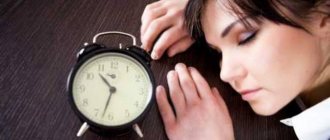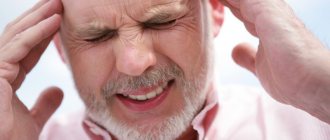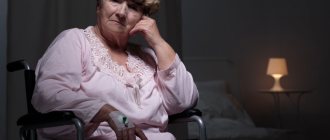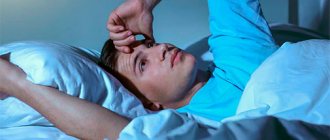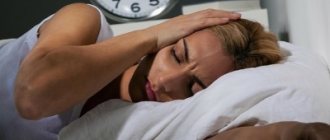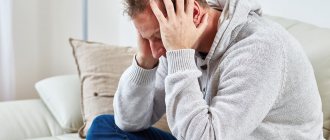Morning anxiety attacks or panic attacks after sleep, as well as any other types of panic attacks, are a sign of disorders in the autonomic nervous system.
In this article we will try to figure out why anxiety occurs in the morning after sleep and how to get rid of it.
So, one of the reasons that provokes fear after waking up is a large number of unprocessed negative emotions, as well as the stressful state in which a person may be. Sometimes the above factors lead to a sharp sudden awakening and a state of fear, in which psychomotor functions and even breathing can be impaired. Moreover, the symptoms described are not necessarily associated with terrible dreams, but they also occur. The problem we are talking about is accompanied by various somatic manifestations, which in turn have a negative impact on the physical condition. Any panic attack is accompanied by a sharp and sudden response of the nervous system to an external event, which, in fact, may not constitute a real threat.
In order to better understand what happens to a person during and after panic attacks, let's consider the general mechanism of its pathogenesis - the mechanism of a panic attack.
A disease of this type is also called an attack of episodic paroxysmal anxiety) - which is a type of anxiety disorder or neurosis, mainly associated with the stressful state of the patient. The mechanism of the disorder is accompanied by a clear and clearly defined episode of unreasonable, but extremely strong anxiety, which arose completely suddenly, reached its climax within a couple of minutes, and lasted about 10 - 20 minutes.
The most striking sign is the suddenness of occurrence and the absence of a real reason for the manifestation of such conditions.
Symptoms of panic attacks after sleep
Often, the main signs of morning anxiety overlap with the symptoms of obsessive-compulsive disorder, among which it is worth noting:
- surprise of manifestation;
- duration from 10 minutes to half an hour;
- time sign
: earlier in the morning or the first minutes after waking up; - physiological signs
: weakness and rapid heartbeat, tremors, chills, sweating, changes in body temperature, chest pain, similar to signs of a heart attack; - obsessive scary thoughts.
Some patients experience a panic attack once every six months, while others may experience it every day, but in any case, this is a reason to consult a specialist.
Causes of feeling anxious after sleep
Panic attacks, as a phenomenon, can overtake a patient at any time of the day and in any circumstances, since this disorder is provoked by internal factors.
Morning panic attacks are characteristic of completely different psychotypes, and as we noted above, one of the symptoms is a feeling of fear for one’s own life.
What provokes this condition? Among the influencing factors are high levels of individual excitability associated with worries and excessive concern for one’s health. Also, if we consider the problem from the point of view of the socio-psychological portrait of the patient, we can identify a certain correlation between the disease and the following life situations:
Quite often, attacks occur in people experiencing a professional crisis. Or those who love their work, which is associated with a reluctance to return to reality. Other reasons include moving to a new place of residence, returning to work after a long break, stress disorder or post-traumatic syndrome (loss of a loved one). Drinking too much alcohol the day before can also cause anxiety attacks, as the body is not able to fully recover.
Also, the likelihood of encountering an anxiety disorder increases in the following cases:
- hereditary predisposition (relatives suffered from neurosis);
- drug and alcohol addiction;
- lack of vitamins or minerals, as well as hormonal imbalances;
- infections that affect brain activity;
- constant stress, disturbances in sleep and wakefulness;
- vegetative-vascular disorders;
- post-traumatic disorder.
Thus, as we see, sudden feelings of anxiety have both somatic and psychosomatic symptoms, which can be conditionally divided into 2 clusters.
Psychosomatics can manifest itself as pathologies and destruction of various types in the functioning of the gastrointestinal tract, leading to the development of disorders in the functions of the cardiovascular and respiratory systems.
Destructions in the patient’s mental state, which can be classified as somatic disorders, are expressed in the form of obsessive thoughts and phobias (most patients have a very pronounced fear of death), depressive syndrome, suicidal tendencies and drug addictions.
In general, panic negatively affects all areas of life and condition, both physically and socially-mentally. That is why it is so important to consult a specialist in time to conduct a professional diagnosis and prescribe appropriate treatment for panic conditions.
The most common complaints observed during early morning awakenings
- Various types of sleep disorders - insomnia, nightmares.
- Difficulty falling asleep, early or night awakenings.
- Feeling guilty that you yourself are largely to blame.
- Headache.
- Attacks of vegetative-vascular dystonia.
- Panic attacks.
- Poor appetite.
- Premature morning awakenings.
Insomnia can manifest itself in different ways. Doctors distinguish several types of sleep disorders:
- Problems falling asleep;
- Night awakenings;
- Early morning awakenings (morning insomnia);
- Feeling sleepy during the day;
- Feelings that sleep is not refreshing
Are you frustrated if you wake up long before your alarm clock?
What if this happens daily, and if awakening occurs 30 minutes later than necessary or more, for example, an hour or more?
“There are so many problems, you get tired during the day, in the evening you fall off your feet, during the day your head hurts, you feel dizzy, the thought is to sleep. In the morning it would be normal to sleep, at least until the alarm clock, but here you wake up early and don’t want to sleep. You toss and turn, and just before the alarm clock you can turn off, and you can oversleep (which has happened more than once), and if you get up, then later, often, some kind of lethargy appears or you want to sleep during the day. In the evening there are again a lot of problems, a lot to do, and it’s impossible to go to bed early. And even if you go to bed, you still wake up early and don’t get enough sleep again.”
Doctors of various specializations can often hear such or similar complaints about early, unreasonable morning awakenings from their patients.
How to correctly assess early morning awakenings, how to deal with them and how urgently this needs to be done.
Early morning awakenings - Are you familiar with this?
If you are familiar with this or close to this situation, then we are talking about
insomnia in the morning.
It's nice to take a little nap early in the morning before finally waking up, but
premature awakening is especially upsetting, because according to most people, morning sleep is the most comfortable, it is during this period that we most often experience dreams, and if morning sleep is not disturbed, we wake up with the feeling that we have rested and “gained strength.”
What can make you wake up earlier than necessary, before the alarm clock?
Early awakenings are always signs of overexcitation of the central nervous system. There are many reasons for the predominance of excitation processes over inhibition in the brain: from asthenia to severe endogenous and organic diseases.
Understanding these potential
reasons for early morning awakening, you are able to find the right solution. Having eliminated (if possible) the causes, you will be able to sleep until the desired time of awakening.
And to do this, it is necessary not to try to solve the problem on your own, but to seek timely medical help in person from a competent psychotherapist. The doctor will be able to correctly assess the current situation and give clear and only correct instructions on how to get rid of early morning awakenings.
If a person wakes up early in the morning, long before the alarm clock, but at the same time he feels a feeling of freshness after sleep, during the day he does not feel lethargy, drowsiness, heaviness in the body, fatigue, headaches or other unpleasant symptoms that reduce the quality of life or performance, then such
Early morning awakenings cannot be called pathological and they cannot be considered as a type of sleep disorder or symptoms of any disease.
Alternatively, if a person suffers from
early morning awakenings in one way or another, if this reduces the quality of his life, reduces performance, causes complaints, then we can talk about insomnia as one or another pathology.
Anxiety after sleep: diagnosis and treatment methods
An anxiety attack, regardless of whether it occurs immediately after sleep, at night or during the day, should not be ignored. Even a one-time attack without prompt diagnosis and, accordingly, treatment can develop into a neurotic disorder, which is much more difficult to treat. Most often, people who are faced with problems in the psychopathic sphere miss the time to contact a specialist due to the fact that they are worried about their “image”. In our society, going to see a psychotherapist, and even more so a psychiatrist, is considered something shameful and even dangerous from the point of view of social stability.
An anxiety attack, regardless of whether it occurs immediately after sleep, at night or during the day, should not be ignored. Even a one-time attack without prompt diagnosis and, accordingly, treatment can develop into a neurotic disorder, which is much more difficult to treat. Most often, people who are faced with problems in the psychopathic sphere miss the time to contact a specialist due to the fact that they are worried about their “image”. In our society, going to see a psychotherapist, and even more so a psychiatrist, is considered something shameful and even dangerous from the point of view of social stability.
Treatment methods include both psychotherapeutic support and drug therapy, as well as adherence to a correct lifestyle. The line of drugs can only be prescribed by the attending physician, and then depending on the stage of the disease, which can also only be determined in a hospital.
Another effective method is to establish a sleep-wake schedule, increase physical activity and time spent in the fresh air, reduce stressful situations whenever possible (changing jobs is often recommended), and stop using nicotine and alcohol.
As with any other problem in the psychopathic sphere, body-oriented practices, breathing exercises and hydrotherapy: meditation, yoga, massage, spa treatments have a great positive impact.
Group and individual therapy with a psychotherapist will help you develop the right strategy for behavior during an attack and master self-help methods if the attack takes you by surprise.
Treatment of anxiety neurosis in
Specialists from the Neopsy Center for Mental Health (Moscow) can cure fear and anxiety neurosis using modern methods of psychotherapy and drug treatment based on evidence-based medicine. At the first consultation with a psychotherapist or psychiatrist, not only the patient, but also his relatives can be present. This will help collect a more complete and reliable history about the patient’s lifestyle, the onset and course of the disease, past illnesses and stress.
If there are symptoms of a somatic and vegetative nature, measures will be prescribed to differentiate anxiety neurosis from other diseases, signs of which these manifestations may be. In such cases, consultations with a cardiologist, endocrinologist, laboratory and instrumental examinations are prescribed. Timely treatment at the initial stage of the disease can be limited to psychotherapeutic influence, which is what the Center’s specialists usually strive for.
When developing a treatment plan, all the features of the patient’s physiology and psyche and the course of anxiety neurosis are taken into account. Taking into account these features, the method of psychotherapeutic influence is selected:
- individual existential, analytical and cognitive behavioral psychotherapy;
- hypnotherapy;
- autogenic training;
- training in breathing exercises and relaxation techniques.
Physiotherapy may be prescribed, including exercise therapy and relaxation massage. In the active stage of the disease, drug therapy is extremely useful, which may include the prescription of antidepressants and tranquilizers. Drugs, dosages and dosage regimens are prescribed strictly individually.
At the Center, an individual approach is a mandatory rule of work for our specialists in the treatment of any pathology, including anxiety neurosis. The experience of the Center’s constantly practicing specialists proves that the prognosis for the treatment of anxiety neurosis is favorable: if the disease is treated at an early stage of its occurrence, more than 90% of patients are cured without the danger of relapse. Timely treatment is the key to a lasting therapeutic effect! Sign up for a consultation through the website services (feedback, make an appointment) or call the specified phone number.
Tips to help you cope with a morning panic attack
It is logical to assume that most often an attack occurs to the patient at the most inopportune time, precisely when he is alone. What can you do to help yourself calm down quickly and return to normal daily activities?
- The first thing a patient should recite
to himself as a mantra? "I'm not in any danger." As we know, a panic attack is extremely rarely associated with a real threat. What can threaten a person in his own home in his own bed? However, in the state of an attack it is quite difficult to reach such awareness. That is why psychotherapists recommend simply trying to distract yourself: counting the objects around you, saying a nursery rhyme, etc., shifting the focus of attention to external mechanical actions. - Breathing practices
. The main therapeutic method for all anxiety disorders. The first disorder that the patient encounters on a physical level is breathing problems, difficulty in inhaling, a feeling of lack of oxygen, etc. In this case, it is very important to exhale as deeply as possible with a medium inhalation; the exhalation can also be voiced. Another exercise involves inhaling slowly for 4 counts, holding your breath for 2 counts and exhaling slowly for 4 counts, followed again by a two-second pause. - Game of emotions
. The patient is asked to act out various emotions on his face: joy, anger, surprise, boredom. Muscle activity on the face very often helps to calm down and relieve an attack-like state.
Cause of morning insomnia
What can cause unwanted
early morning awakenings?
The most common cause is
anxiety and
depression, the presence of which provokes premature awakening in the morning. Almost all depression and most anxiety disorders have sleep disturbances in the form of early awakenings.
Any of the mood disorders (depression, mania, anxiety), which have in their context symptoms of excessive anxiety or low mood, can provoke awakenings, which most often occur several hours before the expected awakening. For example, if the alarm is set to 6 a.m., a depressed person may begin to wake up at 4 a.m. for no apparent external reason.
